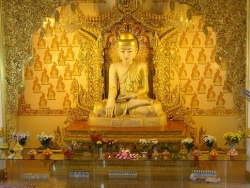Difference between revisions of "Potalaka"
(Created page with "thumb|250px| Mount Potalaka ({{Wiki|traditional Chinese}}: 補陀落山; simplified {{Wiki|Chinese}}: 补陀落山; pinyin: Bǔtuóluò s...") |
|||
| Line 2: | Line 2: | ||
[[Mount Potalaka]] ({{Wiki|traditional Chinese}}: [[補陀落山]]; simplified {{Wiki|Chinese}}: [[补陀落山]]; pinyin: [[Bǔtuóluò shān]], [[Japanese]]: [[Fudaraku-san]]), which means "[[Brilliance]]", is the [[mythical]] dwelling of the [[Buddhist]] [[bodhisattva Avalokitesvara]], said to [[exist]] in the seas [[south]] of [[India]]. The mountain is first mentioned in the final chapter of the [[Flower Garland Sutra]], the [[Gandavyuha Sutra]], where the chapter's {{Wiki|protagonist}} journeys to seek the advice of the [[Bodhisattva Avalokitesvara]]. Later [[Buddhists]], such as the [[Japanese]] [[Yogacara]] [[monk]], [[Jōkei]] ([[monk]]) espoused aspiring [[rebirth]] on [[Mount Potalaka]] as an easier way to attain progress on the [[Buddhist path]] than the more well-known [[Pure Land]] of [[Amitabha Buddha]]. | [[Mount Potalaka]] ({{Wiki|traditional Chinese}}: [[補陀落山]]; simplified {{Wiki|Chinese}}: [[补陀落山]]; pinyin: [[Bǔtuóluò shān]], [[Japanese]]: [[Fudaraku-san]]), which means "[[Brilliance]]", is the [[mythical]] dwelling of the [[Buddhist]] [[bodhisattva Avalokitesvara]], said to [[exist]] in the seas [[south]] of [[India]]. The mountain is first mentioned in the final chapter of the [[Flower Garland Sutra]], the [[Gandavyuha Sutra]], where the chapter's {{Wiki|protagonist}} journeys to seek the advice of the [[Bodhisattva Avalokitesvara]]. Later [[Buddhists]], such as the [[Japanese]] [[Yogacara]] [[monk]], [[Jōkei]] ([[monk]]) espoused aspiring [[rebirth]] on [[Mount Potalaka]] as an easier way to attain progress on the [[Buddhist path]] than the more well-known [[Pure Land]] of [[Amitabha Buddha]]. | ||
| − | [[Mount Putuo]] in {{Wiki|Zhejiang}}, Putuo Zongcheng [[Temple]] in Hebei and the [[Potala Palace]] in [[Tibet]] are named after [[Mount Potalaka]]. | + | [[Mount Putuo]] in {{Wiki|Zhejiang}}, [[Putuo Zongcheng]] [[Temple]] in Hebei and the [[Potala Palace]] in [[Tibet]] are named after [[Mount Potalaka]]. |
{{W}} | {{W}} | ||
Revision as of 14:08, 20 January 2014
Mount Potalaka (traditional Chinese: 補陀落山; simplified Chinese: 补陀落山; pinyin: Bǔtuóluò shān, Japanese: Fudaraku-san), which means "Brilliance", is the mythical dwelling of the Buddhist bodhisattva Avalokitesvara, said to exist in the seas south of India. The mountain is first mentioned in the final chapter of the Flower Garland Sutra, the Gandavyuha Sutra, where the chapter's protagonist journeys to seek the advice of the Bodhisattva Avalokitesvara. Later Buddhists, such as the Japanese Yogacara monk, Jōkei (monk) espoused aspiring rebirth on Mount Potalaka as an easier way to attain progress on the Buddhist path than the more well-known Pure Land of Amitabha Buddha.
Mount Putuo in Zhejiang, Putuo Zongcheng Temple in Hebei and the Potala Palace in Tibet are named after Mount Potalaka.
